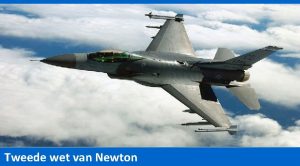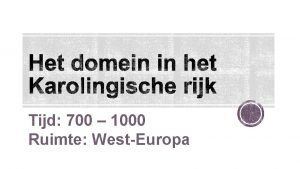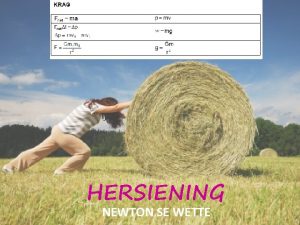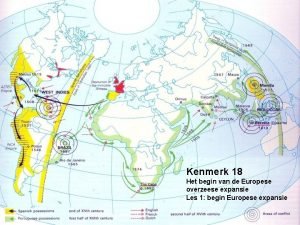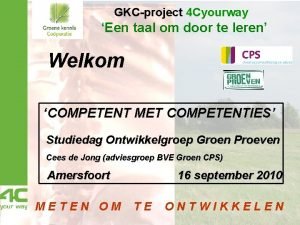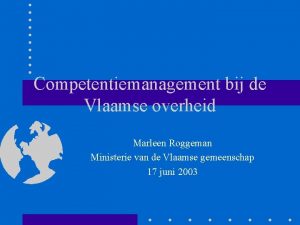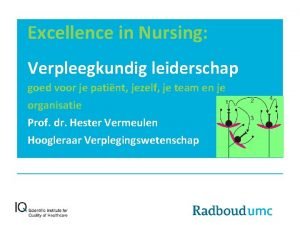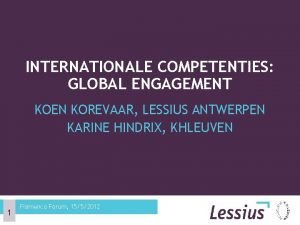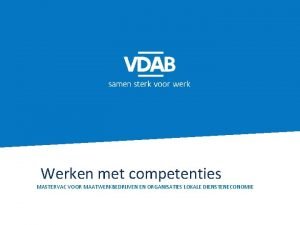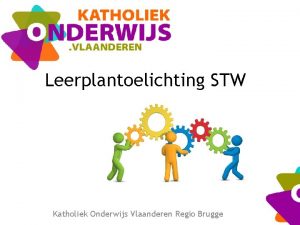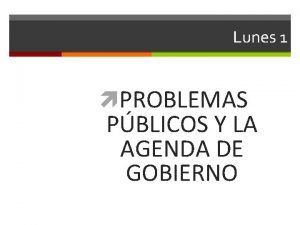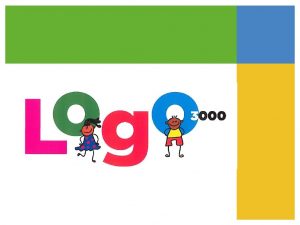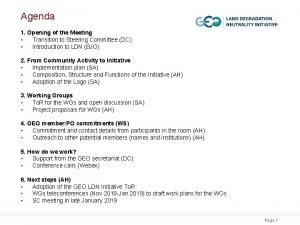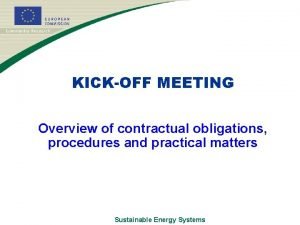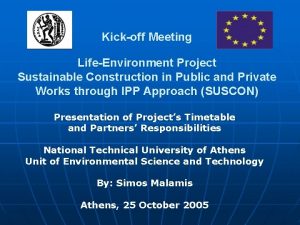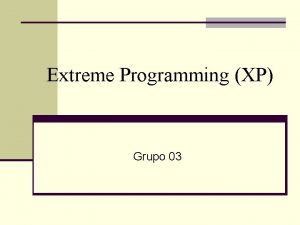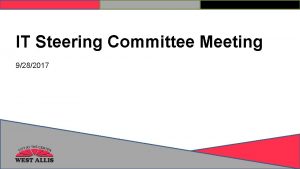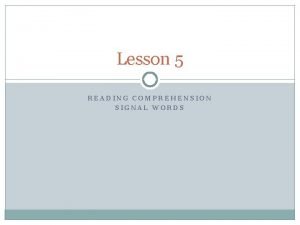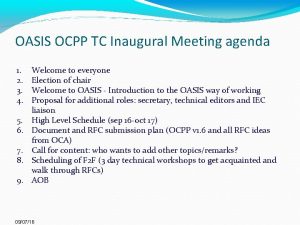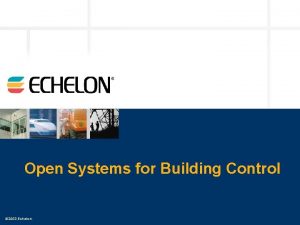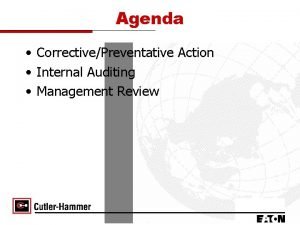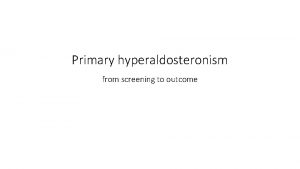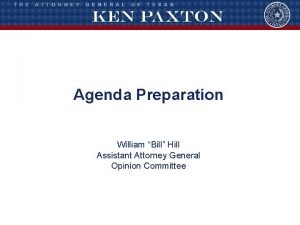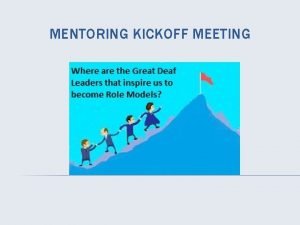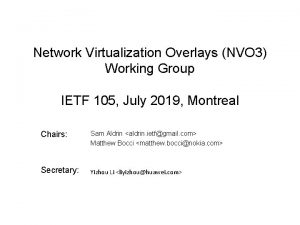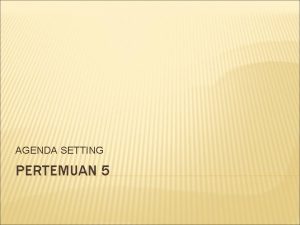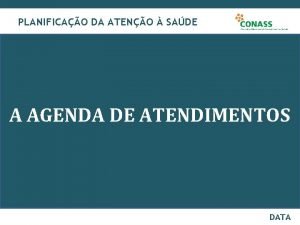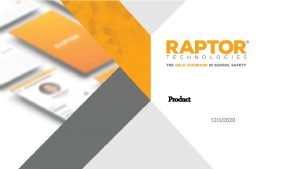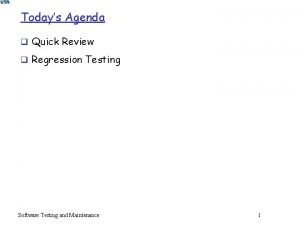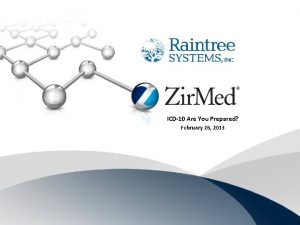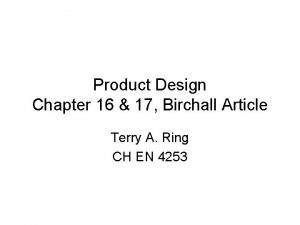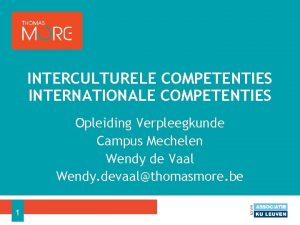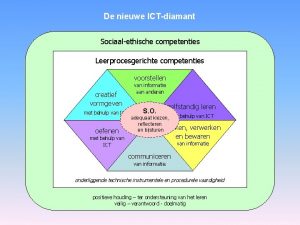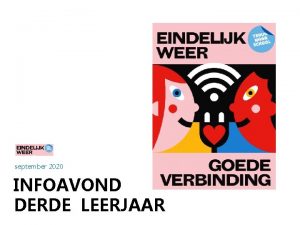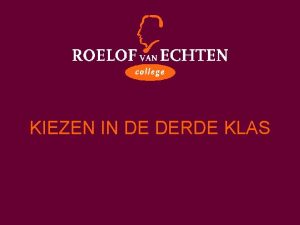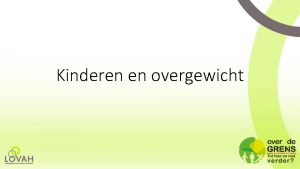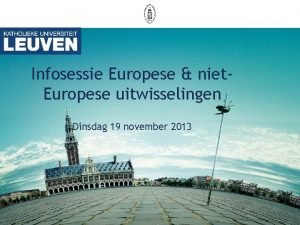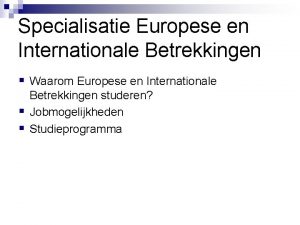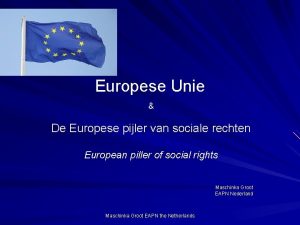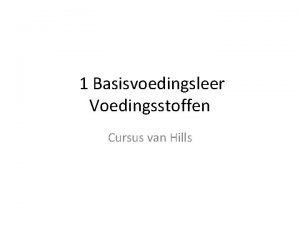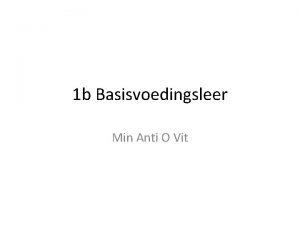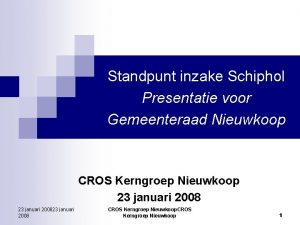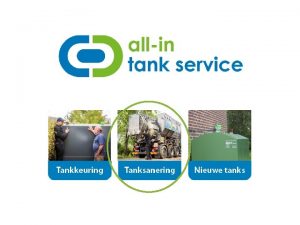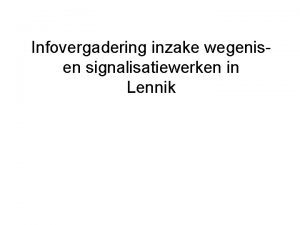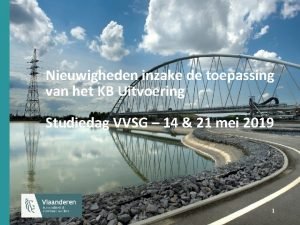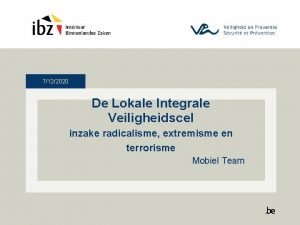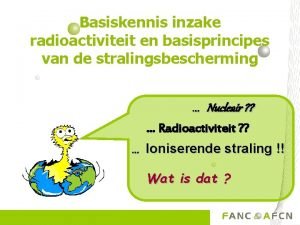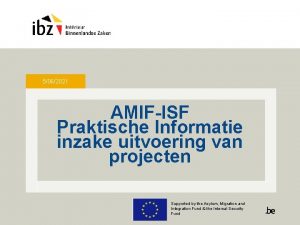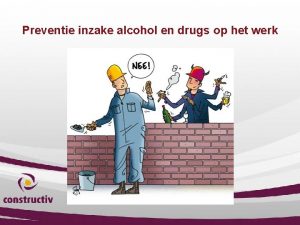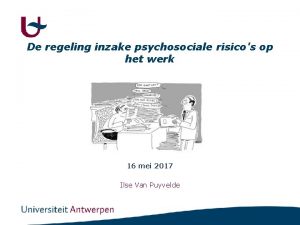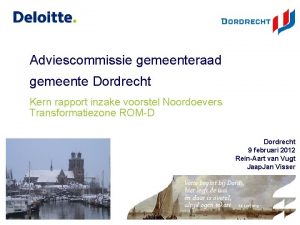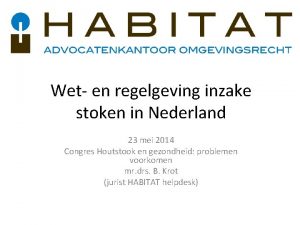DE EUROPESE AGENDA inzake LEERRESULTATEN en COMPETENTIES Derde












































- Slides: 44

DE EUROPESE AGENDA inzake LEERRESULTATEN en COMPETENTIES Derde EVC-studienamiddag 14 februari 2008 Lucien Bollaert Diensthoofd onderwijs en onderzoek HOWEST Vlaams Bolognapromotor Lid E 4/EQAR, QAF, Bolognaseminaries, EQF 1

inhoud 1. 2. 3. 4. 5. 6. 7. 8. Bolognaproces: de actielijnen Bolognaproces: ECTS Bolognaproces: Tuning Bolognaproces: QF of EHEA Kopenhagenproces: EQF EHEA & EQF Vlaanderen Besluiten 2

1. Bolognaproces 1998 -2010 Bologna-proces start met Sorbonne-verklaring (25/05/98) en Bologna-verklaring (19/06/99) n uniek fenomeen: de iure geen bindend internationaal verdrag, maar de facto veel meer dan een gemeenschappelijke politieke beleidsverklaring n proces waarbij regeringen zich op intergouvernementele wijze engageren om hun beleid te coördineren n n 3

1. Bolognaproces n tweejaarlijkse ministeriële conferenties: üBologna (1999) üPraag (2001) üBerlijn (2003) üBergen (2005) üLonden (2007) Leuven/Louvain-la-Neuve (Benelux) (2009) Gent conferentie : na 2010? www. bologna 2009 benelux. org 4

1. Bolognaproces: doelstellingen onmiddellijk: creatie van een Europese Ruimte van Hoger Onderwijs gebaseerd op de principes van transparantie en kwaliteit n achterliggend: ü creatie van een Europa van de kennis: compatibel, vergelijkbaar en mobiel ü ‘employability’ verhogen ü wereldwijde aantrekkelijkheid/concurrentiekracht verhogen ü sociale rechtvaardigheid vergroten en sociale cohesie versterken n 5

1. Bolognaproces: actielijnen n n erkenning van diploma’s: invoering van een systeem van makkelijk leesbare en vergelijkbare diploma’s invoering van een systeem dat voornamelijk gebaseerd is op 3 cycli invoering van een creditsysteem promotie van mobiliteit promotie van Europese samenwerking in kwaliteitszorg promotie van de Europese dimensie in het hoger onderwijs promotie van levenslang leren participatie van instellingen van hoger onderwijs en van studenten promotie van de aantrekkelijkheid van de Europese Ruimte van Hoger Onderwijs integratie van de Europese Ruimte van Hoger 6 Onderwijs en de Europese Onderzoeksruimte

1. n n n n n Bolognaproces: actielijnen & leerresultaten/ competenties erkenning van diploma’s: invoering van een systeem van makkelijk leesbare en vergelijkbare diploma’s invoering van een systeem dat voornamelijk gebaseerd is op 3 cycli invoering van een creditsysteem promotie van mobiliteit promotie van Europese samenwerking in kwaliteitszorg promotie van de Europese dimensie in het hoger onderwijs promotie van levenslang leren participatie van instellingen van hoger onderwijs en van studenten promotie van de aantrekkelijkheid van de Europese Ruimte van Hoger Onderwijs integratie van de Europese Ruimte van Hoger 7 Onderwijs en de Europese Onderzoeksruimte

2. Bolognaproces: ECTS n n n n ECTS = creditsysteem ontwikkeld door de Europese Commissie om studentenmobiliteit te bevorderen European Credit Transfer and Accumulation System “A credit system is a systematic way of describing an educational programme by attaching credits to its components. ” ECTS Users’ Guide 14. 02. 2005 “The definition of credits in higher education systems may be based on different parameters, such as student workload, learning outcomes and contact hours. ” ECTS Users’ Guide 14. 02. 2005 nationale creditsystemen moeten ECTS-compatibel zijn op niveau van opleiding & opleidingsonderdelen validatie van informeel & niet-formeel leren 8

2. Bolognaproces: ECTS n “The European Credit Transfer and Accumulation System is a student-centred system based on the student workload required to achieve the objectives of a programme, objectives preferably specified in terms of the learning outcomes and competences to be acquired. ” ECTS Users’ Guide 17. 06. 07 n Learning outcomes express what a learner is expected to know, understand be able to do after successful completion of a process of learning. They relate to level descriptors in national, sectoral and European qualifications frameworks. “ 9

2. Bolognaproces: ECTS n “Learning outcomes specify the requirements for award of credit. They are formulated by academic staff. The actual competences acquired by the individual learner may of course go beyond the stated learning outcomes. ” n “Competences represent a dynamic combination of attributes, abilities and attitudes. They can be subject specific or generic. Fostering competences is the object of educational programmes; they will be formed in various modules/course units and assessed at different stages. ” www. ec. europa. eu/education/programmes/socrates/ects/guide_en. 10

3. Bolognaproces: Tuning “a university driven project which aims to offer a concrete approach to implement the Bologna process at the level of higher education institutions and subject areas. ” n “The Tuning approach consists of a methodology to (re -)design, develop, implement and evaluate study programmes for each of the Cologna cycle. ” n “Tuning serves as a platform for developing reference points at subject area level. These are relevant for making programmes of studies comparable, compatible and transparant. ” n “Reference points are expressed in terms of learning outcomes and competences. ” n Tuning: Universities’ contribution to the Bologna Process, An introduction 11

3. Bolognaproces: Tuning model 12

3. Bolognaproces: Tuning n “distinction between learning outcomes and competences to distinguish the different roles of the most relevant players: academic staff and students/learners. ” An introduction, p. 8 n ECTS-definities n “Desired learning outcomes of a process of learning are formulated by the academic staff, preferably involving student representatives in the process, on the basis of input of internal and external stakeholders. ” n “Competences are obtained or developed during the process of learning by the student/learner. ” 13

3. Bolognaproces: Tuning n Instrumental n n n n n competences: Capacity for analysis and synthesis Capacity for organisation and planning Basic general knowledge Grounding in basis knowledge of the profession Oral and written communication in your native language Knowledge of a second language Elementary computing skills Information management skills (ability to retrieve and analyze information from different sources) Problem solving Decision-making 14

3. Bolognaproces: Tuning n Interpersonal n n n n competences: Critical and self-critical abilities Interpersonal skills Ability to work in an interdisciplinary team Ability to communicate with experts in other fiels Appreciation of diversity and multiculturality Ability to work in an international context Ethical commitment 15

3. Bolognaproces: Tuning n Systemic n n n competences: Capacity for applying knowledge in practice Research skills Capacity to learn Capacity to adapt to new situations Capacity for generating new ideas (creativity) Leadership Understanding of cultures and customs of other countries Ability to work autonomously Project design and management Initiative and entrepeneurial spirit Concern for quality Will to succeed 16

3. Bolognaproces: Tuning “Although Tuning acknowledges to the full the importance of building-up and developing subject specific knowledge and skills as the basis for university degree programmes, it has highlighted the fact that time and attention should also be devoted to the development of generic competences or transferable skills. This last component is becoming more and more relevant for preparing students well for their future role in society in terms of employability and citizenship. ” www. rug. nl/let/tuningeu r. wagenaar@rug. nl 17

4. Bolognaproces: QF of EHEA Berlijn: “Ministers encourage the member states to elaborate a framework of comparable and compatible qualifications for their higher education systems, which should seek to describe qualifications in terms of workload, level, learning outcomes, competences and profile. They also undertake to elaborate an overarching framework of qualifications for the European Higher Education Area. ” n Bergen: “We adopt the overarching framework for qualifications in the EHEA (…). We commit ourselves to elaborating national frameworks for qualifications compatible with the overarching framework for qualifications in the EHEA by 2010, and to having started work on this by 2007. ” n 18

4. Bolognaproces: QF of EHEA n Londen: n 2. 7 Qualifications frameworks are important instruments in achieving comparability and transparency within the EHEA and facilitating the movement of learners within, as well as between, higher education systems. They should also help HEIs to develop modules and study programmes based on learning outcomes and credits, and improve the recognition of qualifications as well as all forms of prior learning. 2. 8 We note that some initial progress has been made towards the implementation of national qualifications frameworks, but that much more effort is required. We commit ourselves to fully implementing such national qualifications frameworks, certified against the overarching Framework for Qualifications of the EHEA, by 2010. Recognizing that this is a challenging task, we ask the Council of Europe to support the sharing of experience in the elaboration of national qualifications frameworks. We emphasize that qualification frameworks should be designed so as to encourage greater mobility of students and teachers and improve employability. 2. 9 We are satisfied that national qualifications frameworks compatible with the overarching Framework for Qualifications of the EHEA will also be compatible with the proposal from the European Commission on a European Qualifications Framework for Lifelong Learning. 2. 10 We see the overarching Framework for Qualifications of the EHEA, which we agreed in Bergen, as a central element of the promotion of European higher education in a global context. 19 n n n

4. Bolognaproces: QF of EHEA Cyclus Descriptoren ECTS 1) kennis en vaardigheden korte cyclus 2) toepassing kennis & vaardigheden ca. 120 3) beoordelen 4) communicatievaardigheden 5) leervaardigheden 1) kennis en vaardigheden 1 ste cyclus 2) toepassing kennis & vaardigheden 3) beoordelen 180 -240 4) communicatievaardigheden 5) leervaardigheden 1) kennis en vaardigheden 2 de cyclus 2) toepassing kennis & vaardigheden 3) beoordelen 90 - 120 (min. 60) 4) communicatievaardigheden 5) leervaardigheden 1) kennis en vaardigheden 3 de cyclus 2) toepassing kennis & vaardigheden 3) beoordelen / 4) communicatievaardigheden 5) leervaardigheden 20

4. Bolognaproces: QF of EHEA Short cycle (within or linked to 1 st cycle) outcomes ECTS -knowledge and understanding building upon general secondary level supported by textbooks; providing underpinning for work & vocation, personal development & further studies complete 1 ste cycle; -can apply knowledge & understanding in occupational contexts; -are able to identify & use data to formulate responses to concrete and abstract problems; -can communicate about their understanding, skills and activities, with peers, supervisors & clients; -have the learning skills to undertake further studies with some autonomy. c. 120 21

4. Bolognaproces: QF of EHEA 1 st cycle outcomes ECTS -knowledge and understanding building upon 180 -240 general secondary level supported by advanced textbooks, including some knowledge of the forefront of their field of study; -can apply knowledge & understanding indicating professional approach to work or vocation, and have competences of devising and sustaining arguments and solving problems; -are able to gather & interpret relevant data to inform judgements including reflection on social, scientific or ethical issues; -can communicate about information, ideas, problems & solutions to non-/& specialist; -have the learning skills to undertake further 22 studies with a high degree of autonomy.

4. Bolognaproces: QF of EHEA 2 nd cycle outcomes -knowledge and understanding founded upon 1 st cycle, providing basis for originality in developing/applying ideas, often in research context; -can apply knowledge & understanding and problem solving abilities in new environments within broader/multidisciplinary contexts; -are able to integrate knowledge and formulate judgements with limited information, including reflection on social & ethical responsibilities; -can communicate about conclusions, and the underpinning knowledge and rationale to non-/& specialist; -have the learning skills to undertake further studies with a high degree of autonomy. ECTS 90 -120 min. 60 at 2 nd cycle level 23

4. Bolognaproces: QF of EHEA 3 rd cycle outcomes -systematic understanding & mastery of skills & methods of research in that field of study; -are able to conceive, design, implement & adapt substantial process of research with scholarly integrity; -are able to make a contribution through original research extending the frontier of knowledge by a substantial body of work, some meriting (inter)national refereed publication; -capable of critical analysis, evaluation and synthesis of new and complex ideas; -can communicate about expertise with peers, scholars and society in general; -are able to promote academically or professionally in a knowledge based society. ECTS not specified 24

4. Bolognaproces: QF of EHEA anatomie descriptoren/leerresultaten n kennis & inzicht n toepassing van kennis & inzicht n vaardigheid om op problemen succesvol te reageren gebruik makend van gegevens n communicatievaardigheden n leervaardigheden n geordered op een schaal volgens complexionafhankelijkheid & originaliteit n breedste betekenis (competentie), inclusief beroeps-, professioneel & onderzoeks 25 onderwijs

4. Bolognaproces: QF of EHEA n “Traditionally higher education was relatively explicit about the knowledge (outcomes) to be achieved, or at least the knowledge covered by the curriculum. It was however somewhat less explicit on the skills or competences required for the award a given qualification. Competences, such as those of critical evaluation, were and are embedded or implicit in the assessment values and practices. It is becoming increasingly widespread practice that as wide a range of the outcomes as possible are specified. Such explicit specification facilitates the comparison of qualifications. ” (p. 63) 26

4. Bolognaproces: QF of EHEA “The word ‘competence’ is used in the descriptors in its broadest sense, allowing for gradation of abilities or skills. It is not used in the narrower sense identified solely on the basis of a ‘yes/no’ assessment. ” A Framework for Qualifications in the EHEA, 2005 (p. 67) n http: //www. bologna-bergen 2005. no/Docs/00 Main_doc/050218_QF_EHEA. pdf 27 www. vtu. dk

5. Kopenhagenproces § § § Barcelona European Council (March 2002) declaration take action in the field of vocational education and train (VET), similar to Bologna Copenhagen meeting declaration on enhanced European cooperation in VET (November 2002) Education Council resolution (legal basis) to commit EU member states, other EEA countries, accession and candidate countries, European social partners and EC (November 2002) Joint Interim report of the (Education) Council & Commission on the implementation of the “Education and Training 2010” (February 2004) Maastricht Communiqué on future priorities of 28 European cooperation in VET (December 2004)

5. Kopenhagen-proces Main objectives § single framework for transparency of qualifications and competences § cooperation in QA in VET § ECVET, based on competences individuals acquire along their vocational learning route and common princ for validation, in both formal and informal learning § strengthening policies, systems and practices for life guidance § development of qualifications and competences at sectoral level § attention to learning needs of teachers and trainers 29

5. Kopenhagen-proces: EQF consultation document : § structure of 8 levels based on common refere points referring to learning outcomes (knowledge skills) and personal and professional competen (autonomy & responsibility, learning competence communication & social competence, professional & vocational competence) § supported by tools and instruments (ECTAS for LLL, Europass, Ploteus, diploma supplement, etc) § common principles and procedures : QA, validation, guidance and key competences 30

5. Kopenhagen-proces: EQF EP (24. 10. 2007) : § “leerresultaten” bepalen wat een lerende kent, begrijpt en kan doen na de voltooiing van een leerproces; zij worden gedefinieerd in termen van kennis, vaardigheden en competentie; § “kennis” is het resultaat van de assimilatie van informatie door leren. Kennis is het geheel van feiten, beginselen, theorieën en manieren van werken dat verband houdt met een studie- of werkgebied. In het kader van het Europees kwalificatiekader wordt kennis als theoretische kennis en/of feitenkennis beschreven; 31

5. Kopenhagen-proces: EQF EP (24. 10. 2007) : § “vaardigheden” zijn vermogens om kennis toe te passen en knowhow te gebruiken om taken uit te voeren en problemen op te lossen. In het kader van het Europees kwalificatiekader worden vaardigheden als cognitief (logisch, intuïtief en creatief denken) en praktisch (handigheid en de toepassing van methodes, materialen, hulpmiddelen en instrumenten) beschreven § “competentie” is het bewezen vermogen om kennis, vaardigheden en persoonlijke, sociale, interculturele en/of methodologische capaciteiten te gebruiken bij werk of studie en voor professionele en persoonlijke ontwikkeling. In het kader van het Europees kwalificatiekader wordt competentie in termen van verantwoordelijkheid en zelfstandigheid beschreven; 32

6. EHEA & EQF n 07/05 - Commission Staff Working Document: “Towards a European Qualifications Framework for Lifelong Learning” n Bergen: “We underline the importance of ensuring complementarity between the overarching framework for the EHEA and the proposed broader framework for qualifications for lifelong learning encompassing general education as well as vocational education and training as now being developed within the European Union as well as among participating countries” n Londen: “We are satisfied that national qualifications frameworks compatible with the overarching Framework for Qualifications of the EHEA will also be compatible with the proposal from the European Commission on a European higher education in a global context. ” 33

6. EHEA & EQF n EQF 6: n EHEA 1 st cycle: n advanced knowledge of a field n of work or study, involving a critical understanding of theories and principles have demonstrated knowledge and understanding in a field of study that builds upon their general secondary education, and is typically at a level, whilst supported by advanced textbooks, includes some aspects that will be informed by knowledge of the forefront of their field of study n advanced skills, demonstrating n mastery and innovation, required to solve complex and unpredictable problems in a specialised field of work or study can apply knowledge & understanding indicating professional approach to work or vocation, and have competences of devising and sustaining arguments and solving problems; 34

6. EHEA & EQF n n EQF 6: n manage complex technical or n professional activities for decision-making in unpredictable work or study contexts n n EHEA 1 st cycle: are able to gather & interpret relevant data to inform judgements including reflection on social, scientific or ethical issues; can communicate information, ideas, problems and solutions to both specialist and nonspecialist audiences; take responsibility for managing n have the learning skills to undertak professional development of further studies with a high degree o individuals and groups autonomy. 35

6. EHEA & EQF n n n anatomie van descriptioren (kennis, vaardigheden, probleemoplossend vermogen & LL zijn vergelijkbaar communicatie & ethische dimensie niet in EQF vaardigheden & competenties gerelateerd aan de complexiteit van contexten, besluitvorming & (team) management zijn nieuw geen referenties naar formeel onderwijs in EQF methodologie van de EQF-descriptoren is breder of generieker (sectoraal, niet-formeel & informeel leren) 36

6. EHEA & EQF n n n n verschillend in reikwijdte (EQF ruimer voor meer niveaus en voor & met meer belanghebbenden) verschillend in bewoording beide gebaseerd op leerresultaten niveaus & cycli (korte cyclus? ) EQF heeft (nog) geen eengemaakt credit- syste EQF kan EHEA uitgebreiden tot de volledige reikwijdte van LLL NIET TEGENGESTELD, MAAR COMPATIBEL 37

7. Vlaanderen q instellingen van hoger onderwijs: na Ba. Ma en flexibilisering de 3 de hervormingsgolf ü nationale kwalificatiestructuur inschakelen in EHEA & EQF ü inschakelen opleidingen in nationale kwalificatiestructuur ü omschrijven opleidingen en opleidingsonderdelen (vakken, oefenzittingen, seminaries, stages, …) in leerresultaten/ competenties ü vorming docenten en administratoren in denkwijze van leerresultaten/competenties ü leerresultaten in competentietermen ü toekomst associaties (academisering) q q veel meer in de diepte (& structuur)! grotere impact op instellingen 38

8. competentie besluiten n Een competentie is een n observeerbaar (en dus evalueerbaar) n vermogen n door de integratie van kennis, (inzicht), (gedrags)vaardigheid en attitude n om succesvol (en dus probleemoplossend) te functioneren n in een specifieke rol of functie n als maatschappelijk individu 39 n in een contextuele situatie.

8. competentie besluiten (Vlor) n n n n n Een competentie is een geïntegreerde basiscluster van kennis, vaardigheden en attitudes die aan een individu de capaciteiten biedt om effectief te kunnen handelen, problemen te onderkennen en op te lossen en verantwoordelijkheid op te nemen in de context van een bepaalde complexe taak, beroep, functie, rol, netwerk en organisatie. 40 (Vlor, Competentieontwikkelend onderwijs: een verkenning, Brussel, 2008)

8. besluiten n n n 6 dimensies : specificiteit: reikwijdte van generiek tot specifiek integrativiteit: samenhangend geheel voor handelen duurzaamheid: tamelijk constante competentie met veranderende inhoud handelingsgerichtheid: probleemoplossend of functioneringsgericht leerbaarheid: ook beïnvloed door leercompetenties van de student onderlinge afhankelijkheid: in relatie tot elkaar 41 (Van Merriënboer, Van der Klink & Hendriks, NOR, 2002)

8. besluiten n n n Bologna- en Europese processen hebben dynamiek en hervormingen ontwikkeld Bologna ≠ Kopenhagen & Lissabon (verborgen liberalisering? ) processen (EHEA, EQF, LLL, ERA) niet enkel structurele veranderingen, maar ook inhoudelijke competentieagenda is op de voorgrond gekomen curricula uitschrijven in leerresultaten (Tuning) leerresultaten in competentietermen (ECTS, kwalificatiestructuren) eindcompetenties verwerken in opleiding(smatrix-EVC) open, efficient & effectief onderwijs(midden)management (professionalisering) (eind)competenties & QFs moeten ontwikkeld en aanvaard worden door alle betrokkenen & belanghebbenden Europese QFs zijn meta, maar geven ook generieke input belang van maatschappelijke relevantie en (dus) KZ blijft toenemen (internationale geloofwaardigheid & vertrouwen) 42 strategie & synergie nodig!

8. besluiten • nationaal gedirigeerd competitieve marktgedreven • staatsinstellingen autonome instellingen • nationaal internationaal • inspectie verantwoording (KZ) • generatiestudenten LLL • formeel niet-formeel & informeel • docentgecentreerd studentgecentreerd • voorgeschreven programma geïndividualiseerd • niet-accumulatief • leerproces leerresultaten • kennis & vaardigheden competenties 43 • ivoren toren open instellingen

8. besluiten § bijkomende informatie: üwww. bologna 2009 benelux. org üwww. ec. europa. eu dank voor de aandacht vragen & bedenkingen 44
 Signeq
Signeq Wet van newton
Wet van newton Adel clerus derde stand
Adel clerus derde stand Newton se derde wet
Newton se derde wet Europese ziekteverzekeringskaart cm
Europese ziekteverzekeringskaart cm Het begin van de europese overzeese expansie
Het begin van de europese overzeese expansie Shl competenties
Shl competenties Competentiewoordenboek overheid
Competentiewoordenboek overheid Competenties verpleegkundig leiderschap
Competenties verpleegkundig leiderschap Koen korevaar
Koen korevaar Competentiemanagement tool
Competentiemanagement tool Competenties bedrijfseconomie
Competenties bedrijfseconomie 4 competenties io
4 competenties io Competenties verwerven
Competenties verwerven Agenda sistemica y agenda institucional
Agenda sistemica y agenda institucional Hms tavle krav
Hms tavle krav Is logo
Is logo Transition meeting agenda
Transition meeting agenda Football meeting agenda
Football meeting agenda Audit kick off meeting agenda
Audit kick off meeting agenda Kick off meeting agenda for construction project
Kick off meeting agenda for construction project Agenda xp
Agenda xp Agenda humana
Agenda humana It steering committee agenda
It steering committee agenda Agenda reading comprehension
Agenda reading comprehension Oasis virtio
Oasis virtio Chs lancers
Chs lancers Agenda open systems
Agenda open systems Management review agenda
Management review agenda Aldostronism
Aldostronism Accounting meeting agenda
Accounting meeting agenda Seminar agenda template
Seminar agenda template Coaching session agenda
Coaching session agenda Mentorship meeting agenda
Mentorship meeting agenda Network virtualization overlay
Network virtualization overlay Contoh masalah privat
Contoh masalah privat Agenda preparation
Agenda preparation Anti stuttering devices
Anti stuttering devices Agenda aberta
Agenda aberta Qbr agenda
Qbr agenda Agenda q
Agenda q Hidden agenda
Hidden agenda Agenda placeholder
Agenda placeholder Agenda web definite and indefinite article
Agenda web definite and indefinite article Validation meeting agenda
Validation meeting agenda

